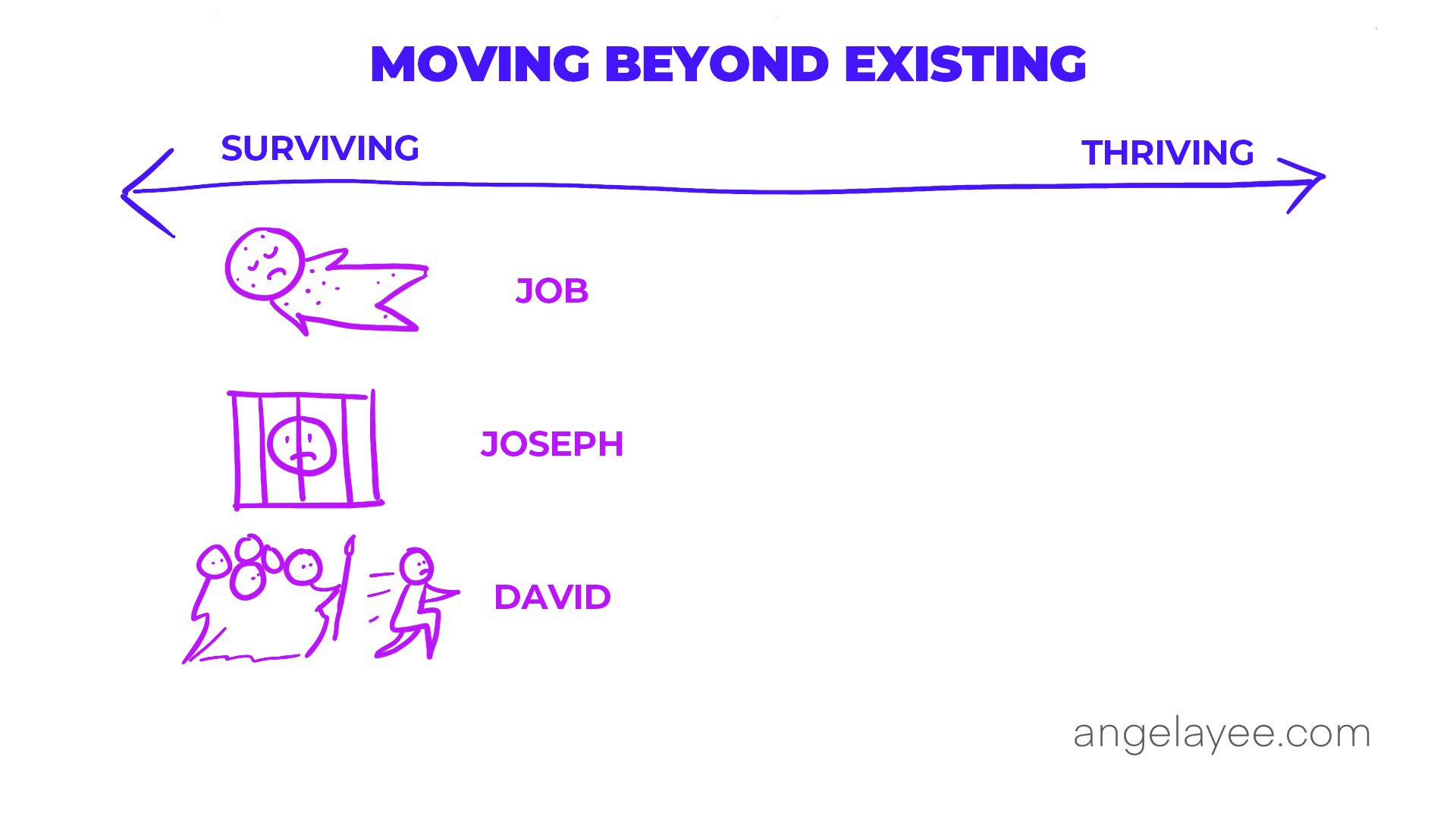Moving Beyond Existing: A Strategy for Ambiguity
These days, when people ask, “How are you?” sometimes it can be a little tricky knowing how to respond.
I have talked to many people who can’t exactly say they’re thriving. But they wouldn’t necessarily put themselves in the surviving category either — after all, they are grateful for food, shelter, and employment.
But they’re somewhere in the middle. Maybe a place of waiting. Things put on hold. An uncertain future. Where it seems there are more things they can’t plan for than they can. They feel like they’re just existing. I feel that way sometimes too!
If you feel this way too, good news — you are not alone!
And along with that, bad news — it’s not a lot of fun. Uncertainty is unsettling. The human brain is wired for certainty.
But what we face is not new. Who in the Bible could fall into the above categories?
I thought of a few.
Surviving
Job when he was sick. Poor guy — he lost his family, his finances, and his support group. Even God was silent. It was Job vs. the universe.
Joseph in prison. Thrown in there unfairly. Forgotten by a potential advocate even after Joseph performed a good deed to get the guy out. Pharoah’s cupbearer was pretty good at serving Pharaoh but not so good at remembering a fellow prisoner who helped him out.
David on the run. David was being unfairly pursued by Saul, sometimes barely surviving by the skin of his teeth. This was not a promising lifestyle for someone who was supposed to be king someday.
Thriving
Now let’s look at the thriving category.
Job after he was restored. God gave him double of everything he had lost. He lived to see his fourth generation of grandchildren.
Joseph after he was elevated. God raised him to be second in command in all of Egypt, and through him, the country was saved from starvation.
David after he became king. God granted him success in overcoming enemies and establishing the nation of Israel.
Isn’t that interesting… the same person experienced both seasons of surviving and seasons of thriving!
What a great reminder that life has seasons. The situation you are in right now is a season. It won’t last forever. You don’t know what the future holds, but the Lord does.
Existing
The other interesting thing I noticed is that there are way more people in the Bible in the center of that spectrum than on either end. The majority of folks would fall in the middle “existing” category.
Moses was in thriving mode in Pharoah’s place until he killed someone and went on the run. He was plodding through the desert, primarily surviving, not thriving, but experiencing day-to-day existence. Their lives were dependent upon, of all things, a cloud!
Jesus’ disciples were on the road a lot. Sometimes things went well, sometimes not. Most of the time, they were in the middle too.
The majority of the people in the Bible had good days and bad days and everything in between. Most Bible stories are about people somewhere in the middle between surviving and thriving.
I could go on with more examples. You get the idea.
What does this say?
It is normal to be in the middle and feel like you are neither surviving nor thriving. In our day and age, where there is so much disruption, crisis, chaos, and ambiguity, if you are in the middle and feeling like you’re just existing, you are not alone.
But I don’t think existing is the right word to use. It’s too limiting, too fatalistic, and certainly not the abundant life that Christ has for us.
So what if we reframed it? Instead of feeling like I’m existing, what if I think of it as expanding?
Expanding
Expanding is growth-oriented. It’s about increasing capacity, learning, and developing.
Ambiguity creates the opportunity to grow. By being open to what God is teaching you, you can:
Increase faith and dependence on Christ. When we know we are not in control, we are reminded that there truly is only one stability in life — our unchanging God. Staying connected to the vine is critical in seasons where it is too easy to become depleted.
Try new opportunities. The pandemic has created opportunities to try new ways of doing things. Experimentation is needed because no one has figured out the best way to do things yet.
Learn new skills. Before the pandemic, many people had never used Zoom. Now I am amazed at how many people who previously never used video calls can join calls and proficiently use features.
Develop capacity for navigating ambiguity. Effectively dealing with uncertainty requires new ways of thinking, developing alternative ideas, and being willing to change if things don’t work out. Although this might feel uncomfortable, you are actually increasing your ability to deal with future disruption.
Strengthen resilience. Research has shown that exposure to suffering increases a person’s resilience. Hardship can provide the benefit of increasing your ability to meet future adversity.
Develop curiosity. A curious mindset is an essential part of learning. Curiosity reduces defensiveness and opens up the mind to what God might be teaching.
A question to ask at the end of each day is, “What did I learn today?” Learning comes not just with experience, but with reflecting and absorbing lessons from experience. Even if something goes badly, you can learn what not to do next time!
What a difference to think of this season as expanding instead of existing. Sure, the circumstances haven’t changed, but the perspective of growing and learning brings purpose to the waiting and uncertainty. You’re not just existing and trying to get through each day, and no pain goes to waste — the Lord continues to work in you to make you more and more like Christ (James 1:2-4).






